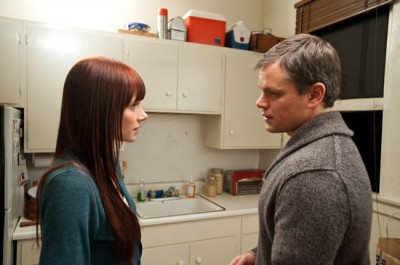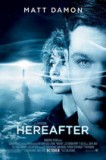| Reviews & Columns |
|
Reviews DVD TV on DVD Blu-ray 4K UHD International DVDs In Theaters Reviews by Studio Video Games Features Collector Series DVDs Easter Egg Database Interviews DVD Talk Radio Feature Articles Columns Anime Talk DVD Savant Horror DVDs The M.O.D. Squad Art House HD Talk Silent DVD
|
DVD Talk Forum |
|
|
| Resources |
|
DVD Price Search Customer Service #'s RCE Info Links |
|
Columns
|
|
|
Hereafter

In a New York Times interview, Hereafter screenwriter Peter Morgan tells the twisty tale of how his script went from an instinctively-written first draft through several revisions for potential director Steven Spielberg before landing with Clint Eastwood, who turned around and shot, basically, the first draft. Similar stories circulated back in 2004, when Eastwood shot Million Dollar Baby from Paul Haggis's first pass, so Eastwood apparently likes the notion of putting the writer's work right up on the screen. "When something hits you and excites your interest," he explains in the Times piece, "there's really no reason to kill it with improvements."
But the trouble is, the script could've used some improvements, and Morgan sounds disappointed rather than flattered. "I imagined we'd have all sorts of conversations about the characters, about the plot," he says. "But we never did." Had the pair taken that extra step of, y'know, working on the screenplay some, here's a few notes they might've come up with:
* The film, a mediation on how those who walk among the living deal with proximity to death, is told though three seemingly unconnected narratives: Marie Lelay (Cécile De France), a French journalist, goes to the brink of her own death when caught in the 2004 Indian Ocean tsunami. George Lonegan (Matt Damon) is a genuine-article psychic who has stopped doing readings because he finds them too upsetting, instead spending his days working a factory job, over the protestations of his wheeler-dealer brother (Jay Mohr). Marcus (George McLaren) and Jason (Frankie McLaren) are British twins, tremendously close, until Jason is killed in a car accident, prompting young Marcus to question what happened to his brother after his death. These three stories proceed independent of each other until--you'll never guess--they unexpectedly intertwine at the end of the movie! This structure was tired when they used it in Babel back in 2006, so let's scratch that and find something a little less overdone.
* One of the reasons to avoid this format is that, inevitably, one of the stories will turn out to be vastly more compelling than the others, making audiences who sense its superiority restless and impatient as the other, less interesting tales unwind. Here, that would be the Damon thread--partially because Damon is a charismatic and interesting actor, partially because his scenes have been written with more detail and less formality than the rest of the script. His reluctance to utilize his "gift" is palpable, and is beautifully illustrated by his flirtation with a cooking classmate (Bryce Dallas Howard), which goes from a charming, funny, sexy "tasting session" to an after-class confession and reading that goes seriously sour. The sluggish picture becomes immediately dynamic in this long session; when it moves on to the other storylines, our hearts sink.
* Unless he invested his previous earnings very wisely, nobody could have an apartment that fabulous in San Francisco on the two grand a month Damon's brother says he makes. Let's fix those lines.
* While we're tweaking dialogue: there's no need for Damon's character to say, "It's not a gift, it's a curse!", and there's certainly no need for him to say it twice. That's not the kind of thing people actually say; that's the kind of thing people say in trailers for movies.
* The arc of the French reporter couldn't be less interesting, particularly when it is laid out in that "poor me" dinner scene with her lover/producer. That scene (and most of her scenes) is soapy and frankly a little dull. Out she goes.
* The mother of the twins gives a big, emotional speech about midway through the movie. I'd forgotten it before it was even over. She's a thin, secondary character, so let's not waste any more time with her than is necessary.
* If you're going to insist on the disconnected-stories-connect-at-the-end structure, then their connections can't be as thin as these. Nice scene with Damon and the kid, though.
Is Hereafter a bad movie? Hardly. The tsunami sequence is terrifying, as is the shocking, unexpected invocation of the London subway bombings. Tom Stern's cinematography is expectedly (and brilliantly) moody, particularly the first reading scene, which keeps Damon all but in silhouette. Damon is disarmingly low-key, Howard matches him well, and the McLaren brothers are good; De France is adequate, if unmemorable. And, in several scenes, Morgan's screenplay finds a real emotional resonance (though not in the final scenes, where the already-flimsy set-up is smothered by Eastwood's corny score--seriously, they've got to stop letting him write those).
For all the goodwill that a new Clint Eastwood picture carries, there's not getting around the fact that this one just doesn't work. Eastwood is eighty years old now, and the fact that he's still turning out a skillfully-made movie once a year (sometimes more often than that) remains impressive. But there's also a fear that, like Woody Allen, he's sometimes working just to work, skipping the kind of up-close pre-production script work that would translate to a tangibly stronger product. There's no bigger Eastwood booster than this one, but even I have to admit that this is his weakest film in years.
Jason lives in New York. He holds an MA in Cultural Reporting and Criticism from NYU.
|
| Popular Reviews |
| Sponsored Links |
|
|
| Sponsored Links |
|
|
| Release List | Reviews | Shop | Newsletter | Forum | DVD Giveaways | Blu-Ray | Advertise |
|
Copyright 2024 DVDTalk.com All Rights Reserved. Legal Info, Privacy Policy, Terms of Use,
Manage Preferences,
Your Privacy Choices | |||||||











